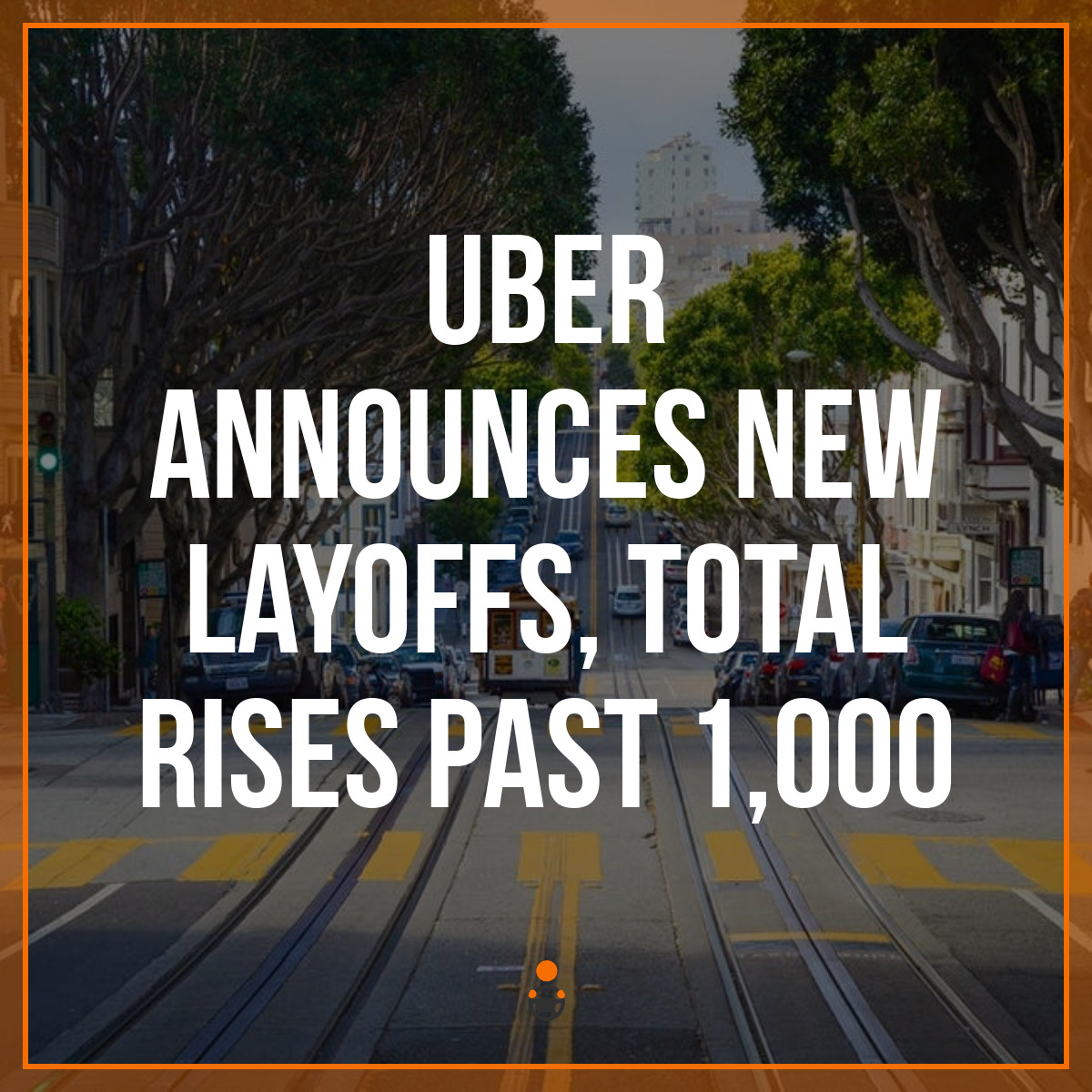More layoff news from Uber this week, with Uber now laying off more than 1,000 workers since July. What could this mean for Uber? Senior RSG contributor John Ince breaks down all the latest news for us in this rideshare roundup.

Uber’s Layoff Total Rises Past 1,000 With Latest Cuts [The New York Times]
Sum and Substance: SAN FRANCISCO — Uber laid off 350 employees on Monday, in the latest indication that the ride-hailing company is trying to respond to concerns among investors that it is losing too much money.
The cuts, the third round in recent months, were focused in the autonomous vehicle unit, operations, recruiting and customer support, an Uber spokesman said. Since July, the company has cut more than 1,000 jobs, more than 2 percent of its work force…
Investors reacted favorably to the layoffs on Monday, sending Uber’s share price up 4 percent in afternoon trading. In July, Uber laid off 400 people from its marketing department. And in September, it cut 435 people from its engineering and product groups. Uber’s chief executive, Dara Khosrowshahi, had asked executives to reduce their staffs and reorganize…
Mr. Khosrowshahi has been under pressure to stem financial losses after Uber’s initial public offering. In August, Uber reported a record quarterly loss of $5.2 billion while it also experienced its slowest-ever revenue growth.Investors have questioned the strength of Uber’s ride-hailing business, while the company has pointed to its growth in its secondary businesses, including food delivery. Last week, Uber announced its intent to acquire the grocery delivery company Cornershop.
The company is set to report its third-quarter earnings in November.
My Take: Okay, here’s the third wave. I suspect this will have some effect on the bottom line but not as much as we might imagine. There’s a smoke and mirrors game going on. Let’s see what this upcoming quarter’s earning report looks like.
Uber Drivers Are Organizing Protests at Billionaire Investors’ Homes [Vice]
Sum and Substance: On November 6, early Uber investors, founders, and employees will be able to cash out of the ride-hailing company for the first time since it went public in May. It could be a bloodbath, or a big payday for those with a large stake in the company.
Investors aren’t the only ones anticipating the occasion, however. Uber drivers—building on momentum from recent organizing victories in California—will use the opportunity to literally get in the faces of the company’s top investors. Rideshare drivers plan to demonstrate outside at least three investors’ homes and offices, including Uber venture capitalist Bill Gurley in Silicon Valley and Uber co-founder Garrett Camp in Los Angeles.
“These guys are making billions of dollars while they’re claiming they can’t afford to pay us a fair wage,” said Jeff Perry, 39, an Uber driver from Sacramento, and one of the protest’s lead organizers. “This is a great opportunity to highlight the differences between the two classes within Uber.”
My Take: I doubt that this protest will be a success, but it’s a nice idea that will gain some publicity.
Ad: Save money every time you shop for groceries using this Fetch Rewards referral code.
Uber, Lyft to skip congressional hearings on their safety, labor practices [Philadelphia Enquirer]
Sum and Substance: WASHINGTON — Uber and Lyft have decided to skip a congressional hearing Wednesday aimed at examining their safety and labor practices, risking aggravating members of the committee who are threatening to press ahead regardless with new legislation.
The two companies have come under increased scrutiny in recent months over their treatment of drivers and their efforts to keep passengers safe, prompting a House Transportation and Infrastructure subcommittee to call a committee meeting and demand that the companies testify on the future of ride-hailing.
Both Uber and Lyft decided not to send representatives, however, according to company and Transportation Committee officials. That prompted Transportation Committee Chairman Peter DeFazio, D-Ore., to say that the panel will press ahead with legislation that could encompass safety and labor for transportation network companies, or ride-hailing companies, with or without their cooperation, according to prepared remarks he planned to deliver Wednesday that were reviewed by The Washington Post ahead of the hearing.
My Take: I’m not sure I understand this. What do you have to lose by sending someone – well, not anyone, but someone who can represent this company well? Sure, that person needs to have to have thick skin, but surely Uber can find that kind of person?
Interview with Pete Evenson Co-Founder of Swoop [Inside]
Sum and Substance:
Q: What does Swoop do?
Swoop is a platform that makes it easy for people and companies to book group transportation. It’s a marketplace model, meaning we don’t own any vehicles and instead take over the entire operations process of fleet managers, rather than just being the broker. Our platform gives customers access to a variety of black cars, Sprinter vans, party buses, shuttles, coaches and limousines. Our customers are a mix of businesses, event planners, and groups of people. They plan weddings, team off-sites, or go to events such as concerts, wine tasting, and sporting events. Our motto is: if you’re going with a group, think Swoop.
Q: What role in your background best prepared you to become the co-founder of a startup?
Before starting Swoop, I was a strategy consultant, a project manager, a marketing coordinator…even an analyst for the Department of Defense at the Institute for Creative Technologies. However, becoming a founder really stemmed from my parents — both were entrepreneurs and ran small businesses in Los Angeles. As a kid, I was aware of their work ethic and drive, and also their ability to balance work and parenting. It was inspiring. They always encouraged me to start my own company; however, my path took a little longer than initially expected….
Q: Swoop seems like a great service for startups to go out for a night on the town (read: drinking will be involved). Does your sales team go after that market, and has it been successful?
We build partnerships with the destinations to which people are traveling. However, this wasn’t the original plan. Early on, when we first started Swoop, it was an on-demand party bus company. Initially, that meant that people would book 10-15-passenger party buses equipped with bright lights, wrap-around seating, and big sound systems. Over the first six months, we got a ton of bookings, but quickly learned a few things that changed our customer acquisition model: 1) groups wanted choice and variety outside of just party buses 2) they wanted the ability to book in advance and not only on-demand and 3) groups were always going to a destination: wineries, concert venues, corporate offsite locations, etc. That’s when we shifted our sales approach, so that today, Swoop partners directly with businesses, destinations, and event organizers to become their exclusive transportation provider. The partner makes the referral to the customer who purchases directly from Swoop for their event. These partners generate demand and feed our retention. While drinking on the Swoop is a bonus, we like to say that our automated booking platform, hundreds of unique vehicles, 24/7 concierge service, and logistical expertise have been some of the primary reasons that channel partners work directly with Swoop.
My Take: This is an interview with the co-founder of Swoop, Pete Evenson, who started a company that shuttles around people for parties, other large events and more. You can read more about Swoop in our profile – overall an interesting behind the scenes look.
Remote-controlled scooters are coming, and Tortoise is (slowly) leading the charge [The Verge]
Sum and Substance: You may have noticed that scooter companies typically have short names — usually around four or five letters — that are meant to invoke feelings of flying or zooming across an urban landscape unencumbered. Think Bird, Spin, Scoot, Bolt, Jump, Wheels, etc.
Tortoise is not a scooter company. That should be obvious from the startup’s name, which invokes a character who is slow but clever, ultimately defeating a much faster opponent. Tortoise is working with scooter companies to introduce a seemingly radical concept: scooters that can move autonomously across a city and reposition themselves, without a rider. That’s right. Autonomous scooters.
Editor’s Note: A unique write up on Tortoise, which author Andrew Hawkins astutely points out is not a scooter company, but rather an autonomous scooter company. It’s a cool development with interesting work opportunities as a teleoperator. You can learn more about Tortoise in my podcast interview with Tortoise founder Dmitry Shevelenko here.
Readers, what do you think of this week’s roundup?
-John @ RSG




